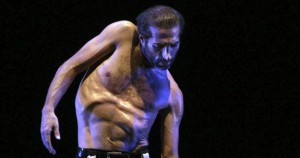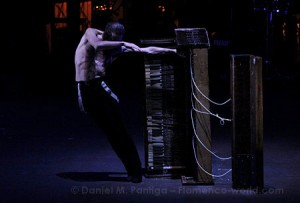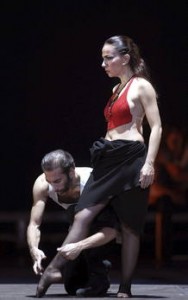By Rachel Straus
The most indelible dance production of the year, for this writer, was the world premiere of Lo Real/Le Réel/The Real. Conceived by the flamenco dancer-choreographer Israel Galván, and seen December 22 at Madrid’s prestigious Teatro Real, Lo Real’s subject is the Nazi’s genocide of the Roman and Sinti people (otherwise known as the gypsies). This intermission-less, two hour and ten minute production is nothing but ambitious. But in the hands of the 39-year-old Galván, Lo Real neither traffics in sentimentalism nor graphic violence. Instead the work reads like a metaphysical inquiry, an exploration into the fundamental nature of being in the world.
Consider this scene. Galván hammers an old upright piano apart with his sputtering footwork. In doing so, he destroys the harmonic integrity of the instrument. When he forces the piano apart, we hear its strings shrieking as they stretch. We see Galván in a deep lunge with his muscular arms working to push the battered object to its breaking point. But the piano doesn’t dissemble. Instead its strings, like Galván’s wiry body, produce a shrill, taut dissonance, one that is awe-inspiring in its intensity. At this moment, the image of the persecuted gypsy becomes real: Galván, stripped of his shirt, dances while caught in a barbed wire fence. His angular, contorted gestures and his sharp, hard footwork eviscerate him as they reveal the unique quality of his dancing, which bends the tradition of the Seville school of flamenco beyond recognition.
The title of Galván’s production is key to understanding the choreographer’s perspective. Lo Real/Le Réel/The Real isn’t some semantic word play favored by choreographers wishing to seem intellectual. It’s a functional title. By inscribing the same word in Spanish, French, and English, Galván alludes to the foremost countries (Spain, France, the U.S and UK) that have consistently embraced Galván’s artistry. The title also pays homage to Jacques Lacan’s theory of The Real, which states how the real is that which is authentic and absolute.
Death, Galván has alluded in interviews, is his Real. And in his production, directed by Pedro G. Romero and Txiki Berraondo, it is treated through a reel of distinct images and scenes. Some are comedic: The Nazi film director Leni Riefenstahl appears as a vamp in a red tuxedo-style corset who straddles an old-fashioned lighting stand, thanks to dancer Isabel Bayón’s frighteningly certain performance. Some of Lo Real’s images are tragic: In the finale of Belén Maya’s solo, she cannot stand. Nonetheless, Maya performs her rhythmic footwork while lurching forward to the lip of the stage on her forearms.
Almost all of the spectacular performers, including singers David Lagos and Tomás de Perrate, guitarists Chicuelo and Caracafé, violinist Eloísa Cantón, drummer Bobote and dancing wife Uchi, emerge from the recesses of the vast stage like specters. Either alone or in pairs, they perform transcendent defiances against the inevitability of death, through their song and dance.
Galván’s Lo Real/Le Réel/The Real will next be performed in Paris, Amsterdam and Ludwigsburg and then will return to Spain via stops in Seville and Granada. Let’s hope it comes to New York soon, before another year ends.


